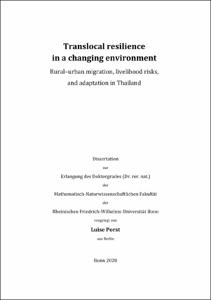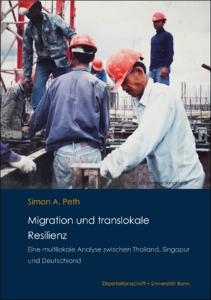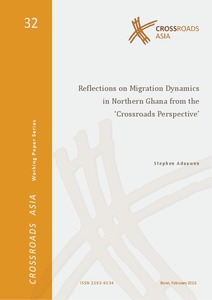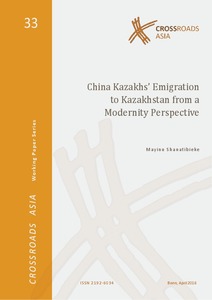Translocal resilience in a changing environmentRural-urban migration, livelihood risks, and adaptation in Thailand

Translocal resilience in a changing environment
Rural-urban migration, livelihood risks, and adaptation in Thailand

| dc.contributor.advisor | Sakdapolrak, Patrick | |
| dc.contributor.author | Porst, Luise | |
| dc.date.accessioned | 2021-01-25T10:38:05Z | |
| dc.date.available | 2021-01-25T10:38:05Z | |
| dc.date.issued | 25.01.2021 | |
| dc.identifier.uri | https://hdl.handle.net/20.500.11811/8891 | |
| dc.description.abstract | This dissertation addresses the intersection of rural livelihoods, resilience towards risks and changes, and migration. By and large, it spotlights the migration–resilience interaction in the con-text of rural transition from an everyday-life perspective by elucidating the role of rural–urban migration for rural livelihoods undergoing change, i.e. against the backdrop of environmental stress and changing weather patterns, amongst other factors. More specifically, it explores how connections between migrants and their respective households of origin influence capacities and resources of these households, located in rural areas, to manage risks and opportunities in a changing environment. The aim is thus to comprehend how migrant–household connections between the places of origin and destination shape the social resilience of households across space and place boundaries. Emphasis is placed on the circumstances of migration and its potentials for the social resilience of migrant households. Moreover, the thesis focuses on domestic migration; specifically, rural–urban migration in Thailand has served as the empirical example.
To better comprehend the intersection of rural–urban (migration-related) exchange relations and strategies for facing risks in agriculture-based livelihoods, a practice-oriented translocal-resilience approach has been developed which accommodates place- and scale-specificity and spotlights the interlacing of places through connections and multiple socio-spatial embeddedness. Hence, the circumstances, overlapping positionings, and interconnected everyday activities at both migrants’ places of origin and destination are addressed at the same time. Accordingly, this thesis’ empirical data basis was produced by means of a multi-sited research strategy. This involved the use of mixed-methods in three rural study sites in North and Northeast Thailand and in peri-/urban neighborhoods in Bangkok (Metropolitan Region). The research shows that the circumstances in translocal relations affect households’ livelihoods and resilience differently, ranging from stabilizing to destabilizing effects for both the migrant at the place of destination and the household at the place of origin. The first conclusion is therefore that, to comprehend the links between migration and ways of dealing with environmental change, including impact from climate change, both everyday practices and circumstances in multiple specific places and factors and variables on more encompassing levels than those of the individual and household need to be taken into account, including socially constructed and constantly renegotiated gender and class relations, socio-economic circumstances, and the rural–urban interlacing beyond individual migrant–household connections. Secondly, this study’s results suggest that the area of responsibility for dealing with environmental risks and change, including, for instance adaptation to climate change, cannot be devolved to individual households and migrants, despite their agency and partially extended room for maneuver through migration and translocal connections. On a conceptual level, this thesis shows that social resilience, viewed from a translocal and practice-focused perspective, enables a profound analysis, and therefore a more nuanced understanding of migration impacts in the context of environmental risks and change. | en |
| dc.language.iso | eng | |
| dc.rights | In Copyright | |
| dc.rights.uri | http://rightsstatements.org/vocab/InC/1.0/ | |
| dc.subject | Translokalität | |
| dc.subject | Soziale Resilienz | |
| dc.subject | Stadt-Land-Beziehungen | |
| dc.subject | Interne Migration | |
| dc.subject | Migration-Klimawandelanpassung | |
| dc.subject | Thailand | |
| dc.subject | Ländliche Transformation | |
| dc.subject | Livelihood Risiken | |
| dc.subject | Prekarität | |
| dc.subject | Translokale Verbindungen | |
| dc.subject | Translokale Einbettung | |
| dc.subject | Skalen | |
| dc.subject | Soziale Praxis | |
| dc.subject | Positionalität | |
| dc.subject | Translocality | |
| dc.subject | Social resilience | |
| dc.subject | Rural-urban relations | |
| dc.subject | Internal migration | |
| dc.subject | Migration impact | |
| dc.subject | migration-as-adaptation | |
| dc.subject | Rural transition | |
| dc.subject | Livelihood risks | |
| dc.subject | Precarity | |
| dc.subject | Translocal connections | |
| dc.subject | Translocal embeddedness | |
| dc.subject | Scale | |
| dc.subject | Social practice | |
| dc.subject | Positionality | |
| dc.subject.ddc | 910 Geografie, Reisen | |
| dc.title | Translocal resilience in a changing environment | |
| dc.title.alternative | Rural-urban migration, livelihood risks, and adaptation in Thailand | |
| dc.type | Dissertation oder Habilitation | |
| dc.publisher.name | Universitäts- und Landesbibliothek Bonn | |
| dc.publisher.location | Bonn | |
| dc.rights.accessRights | openAccess | |
| dc.identifier.urn | https://nbn-resolving.org/urn:nbn:de:hbz:5-60811 | |
| ulbbn.pubtype | Erstveröffentlichung | |
| ulbbnediss.affiliation.name | Rheinische Friedrich-Wilhelms-Universität Bonn | |
| ulbbnediss.affiliation.location | Bonn | |
| ulbbnediss.thesis.level | Dissertation | |
| ulbbnediss.dissID | 6081 | |
| ulbbnediss.date.accepted | 30.11.2020 | |
| ulbbnediss.institute | Mathematisch-Naturwissenschaftliche Fakultät : Fachgruppe Erdwissenschaften / Geographisches Institut | |
| ulbbnediss.fakultaet | Mathematisch-Naturwissenschaftliche Fakultät | |
| dc.contributor.coReferee | Verne, Julia |
Files in this item
This item appears in the following Collection(s)
-
E-Dissertationen (4074)







